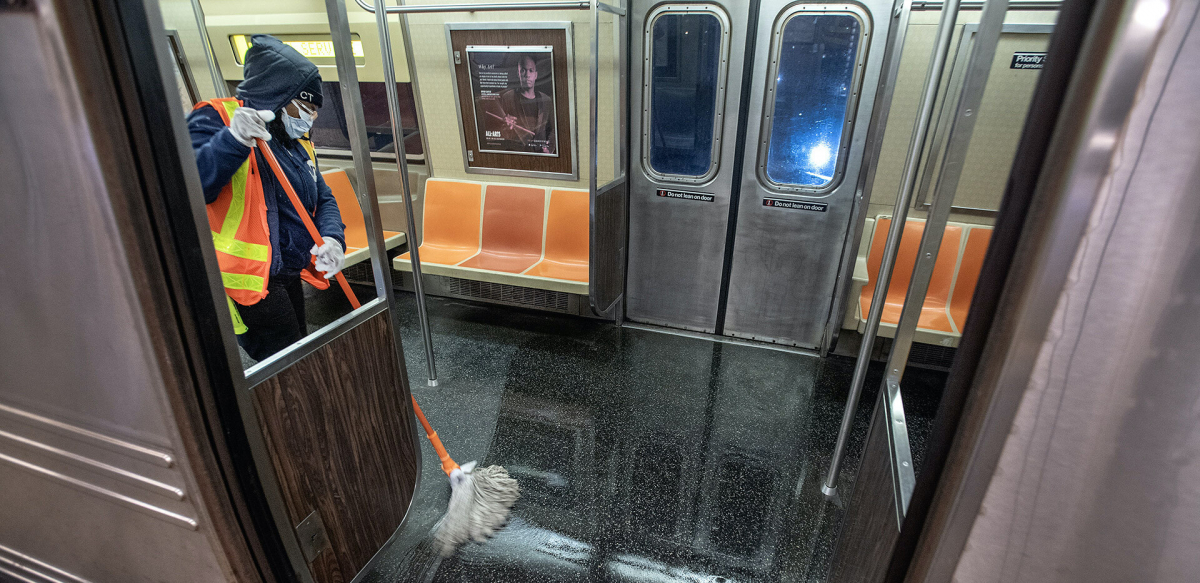Don't Guess What's on Your Co-Workers' Minds: Allow Yourself to Be Surprised

When the workers who cleaned New York City subway cars were told in 1935 that they would have to use squeegees that were 14 inches long, rather than 10, they refused. The “squeegee strike” was a huge leap forward for the Transport Workers Union's organizing. Photo: Patrick Cashin / MTA New York City Transit, CC BY 2.0.
Listening is one of the most important skills for a workplace organizer. And you’ve got to allow yourself to be surprised about what you might hear—and what you do with it.
I was reminded of this recently while reading about the early days of organizing the Transport Workers Union in New York City’s subway and bus system. When TWU was getting its start, unions in the transit system had been severely repressed for decades, and had trouble holding ground.
But the big break came in 1935 when the workers who cleaned subway cars were told that they would have to use squeegees that were 14 inches long, rather than 10—an attempt to get more cleaning in less time.
SQUEEGEE STRIKE
These were workers who, like many others during the Great Depression, had had their wages unilaterally cut; they faced the constant threat of being laid off or replaced. They had plenty of other pressing issues.
Yet it was this attempt to speed up their work and control how they did their jobs that pushed them over the edge.
Six TWU members were fired for refusing to use the new squeegees, and their co-workers walked off the job in the first New York subway strike in a decade. Not only did they win reinstatement for the fired workers, but they also got to keep the 10-inch squeegees.
The “squeegee strike” was a huge leap forward for TWU’s organizing. Within two years, the union had won official recognition in landslide, high-turnout elections.
While wages and benefits are a motivating factor in organizing, often the things that really get people riled up have more to do with the daily grind and the petty tyranny of workplace dictators.

SUPPORT LABOR NOTES
BECOME A MONTHLY DONOR
Give $10 a month or more and get our "Fight the Boss, Build the Union" T-shirt.
I’m talking about the bosses who insist you do the job their way, when you know it’s not the best way; who create absurd rules; who try to squeeze every ounce of work out of you; who wield their power just because they can.
Listen, and you’ll find these issues.
RATS AND PIGEONS FIRST
Working with a different group of TWU members 80 years after the squeegee strike, I caught myself almost not following this advice.
One group of bikeshare workers, responsible for installing stations on sidewalks and roadbeds, was more precarious than the others because the employer was deliberately misclassifying them. I was convinced this was the fight we should take on first. It was an injustice, and resolving it would materially improve their situation as well as strengthen the union.
But when I spoke to the workers—and listened—their most immediate concern was the filthy working conditions in a rat- and pigeon-infested area under a bridge.
So we mobilized to demand that the work be relocated to a cleaner spot, enlisting workers in other departments to show their solidarity. We won, and then turned to fight—and win—on the misclassification issue. It helped us build a union presence and find new activists in a department where we hadn’t been as strong.
This is why it’s so important to have genuine conversations. If you go in with your petition already written, confident about what it is that everyone cares about, you may be missing something deeper. And that something deeper could bring more people together, get more people involved, and build more power.
You don’t need to guess what that thing might be—people will tell you! Allow yourself to be surprised at what your co-workers care about. It will help you build a stronger union.





